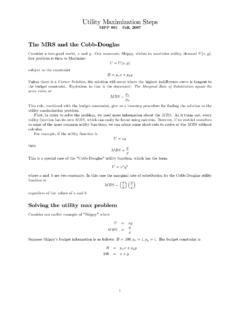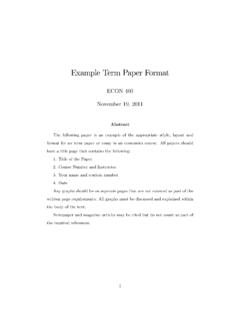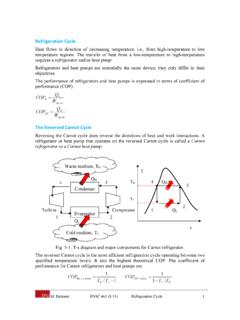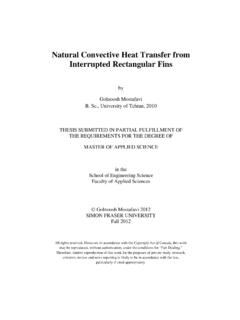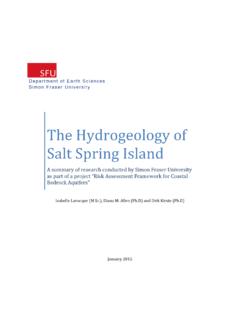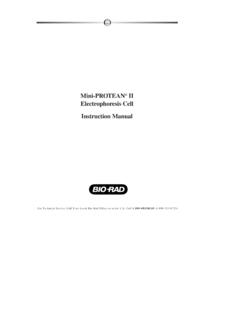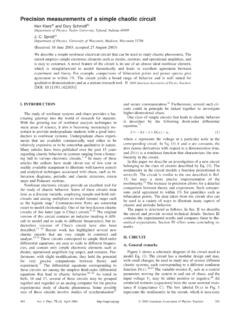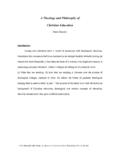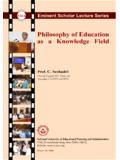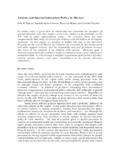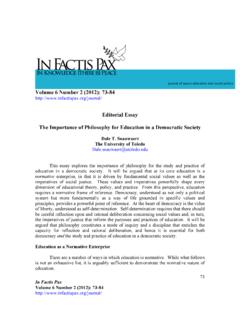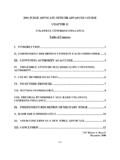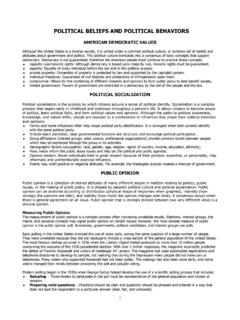Transcription of Where Politics and Evaluation - SFU.ca
1 93 TracesWhere Politics and EvaluationResearch MeetCAROL H. WEISSC arol H. Weiss - Professor, Graduate School of education , Harvard University, Cambridge, MA are what evaluators left behind discoveries, records, tracks which mademarks on the profession of program Evaluation . Published here are excerpts fromour past ( , articles, passages from books, speeches) that show Where we havebeen or affected Where we are g(r)o(w)ing. Suggestions for inclusion should be sentto the Editor, along with rationale for their import. Photocopies of the originalprinted versions are preferred with full bibliographic information. Copying rightswill be secured by the s Note: I am delighted to be able to reprint Carol H.
2 Weiss 1973 paper entitled" Where Politics and Evaluation research meet." Many years ago when I first becameinterested in Evaluation , her work made sense to me because of her obvious appre-ciation for the realities of assessing (and implementing) people-type programs. Butthat, in itself, would not suffice for honoring her here in Traces. Others who havestudied the theories and the theorists of Evaluation credit her with influencing theirthinking, such as Lee Cronbach in his 1982 book, Designing Evaluations of Educa-tional and Social Programs, and with having brought a new perspective to bear onevaluation, that is, with being a Stage Two theorist Will Shadish et al.
3 In their 1991 book Foundations of Program is indebted to Dr. Weiss for writing an "update" to the 1973 article, entitled" Politics and Evaluation : A Reprise with Mellower Overtones." Her 1992 reflectionsimmediately follow the 73 work. We are also indebted to the Minneapolis MedicalResearch Foundation, Inc., for permission to publish the article which appeared inEvaluation, Vol. 1, 37-45. In turn, the article was based upon a paper that Dr. Weisspresented to the annual meeting of the American Psychological Association onAugust 30, research is a rational enterprise. It examines the effects of policies and programson their targets-whether individuals, groups, institutions, or communities- in terms ofthe goals they are meant to achieve.
4 By objective and systematic methods, Evaluation at SIMON FRASER LIBRARY on February 2, from 94research assesses the extent to which goals are realized and looks at the factors that areassociated with successful or unsuccessful outcomes. The assumption is that byproviding the facts, Evaluation assists decision-makers to make wise choices amongfuture courses of action. Careful and unbiased data on the consequences of programsshould improve Evaluation is a rational enterprise that takes place in a political context. Politicalconsiderations intrude in three major ways, and the evaluator who fails to recognizetheir presence is in for a series of shocks and frustrations:First, the policies and programs with which Evaluation deals are the creatures ofpolitical decisions.
5 They were proposed, defined, debated, enacted, and funded throughpolitical processes, and in implementation they remain subJect to pressures-bothsupportive and hostile-that arise out of the play of , because Evaluation is undertaken in order to feed into decision-making,its reports enter the political arena. There evaluative evidence of program outcomeshas to compete for attention with other factors that carry weight in the political , and perhaps least recognized, Evaluation itself has a political stance. By itsvery nature, it makes implicit political statements about such issues as the problematicnature of some programs and the unchallengeability of others, the legitimacy ofprogram goals and program strategies, the utility of strategies of incremental reform,and even the appropriate role of the social scientist in policy and program that political constraints and resistances exist is not a reason for aban-doning Evaluation research.
6 Rather it is a precondition for usable Evaluation when the evaluator has insight into the interests and motivations of other actorsin the system, into the roles that he himself is consciously or inadvertently playing, theobstacles and opportunities that impinge upon the evaluative effort, and the limitationsand possibilities for putting the results of Evaluation to work---only with sensitivity tothe Politics of Evaluation research-can the evaluator be as creative and strategicallyuseful as he should ARE POLITICAL CREATURESE valuation research assesses the effects of social programs, which in recent years haveincreasingly been governmental programs and larger in scale and scope than theprograms studies in earlier decades.
7 There have been important evaluations of jobtraining programs, compensatory education , mental health centers, community healthservices, Head Start and Follow Through, community action, law enforcement, cor-rections, and other government interventions. Although there have been occasionalstudies of long-established traditional services, most Evaluation efforts have beenaddressed to new programs; it is the program into which new money is being pouredthat tends to raise the most immediate questions about viability and programs with which the evaluator deals are not neutral, antiseptic, laboratory-type entities. They emerged from the rough and tumble of political support, opposition, at SIMON FRASER LIBRARY on February 2, from 95and bargaining.
8 Attached to them are the reputations of legislative sponsors, the careersof administrators, the jobs of program staff, and the expectations of clients. The supportof these groups coalesces around the program, but the counterpressures that wereactivated during its development remain active and the program remains vulnerable tointerference from legislatures, bureaucracies, interest groups, professional guilds, andthe media. It is affected as well by interagency and intraagency jockeying for advantageand Politics of program survival is an ancient and important art. Much of theliterature on bureaucracy stresses the investment that individuals within an organiza-tion have in maintaining the organization s existence, influence, and empire.
9 AsMorton Halperin succinctly states:Organizational interests, then, are for many participants a dominant factor in determiningthe face of the issue which they see and the stand which they take .. Organizations withmissions strive to maintain or to improve their (1) autonomy, (2) organizational morale, (3)organizational essence, and (4) roles and missions. Organizations with high-cost capabili-ties are also concerned with maintaining or increasing (5) budgets. It is not only around Evaluation that social scientists bemoan the political factorsthat distort what they see as rational behavior. Economist Julius Margolis recentlynoted:.. you may go through a scientific analysis to answer the question of Where the airportshould be located, but an altogether different decision may finally emerge from , or in our terms program administrators and operators, are not irra-tional ; they have a different model of rationality in mind.
10 They are concerned not justwith today s progress in achieving program goals, but with building long-term supportfor the program. This may require attention to factors and to people that can be helpfulin later events and future contests. Administrators also have to build and maintain theorganization-recruit staff with needed qualifications, train them to the appropriatefunctions, arrange effective interstaff relations and communications, keep peoplehappy and working enthusiastically, and expand the influence and mission of theagency. There are budgetary interests, too, such as the need to maintain, increase ormaximize appropriations for agency functioning. Clients have to be attracted, afavorable public image developed, and a complex system managed and the goals for which the program was set up is not unimportant, but itis not the only, the largest, or usually the most immediate of the concerns on theadministrator s when an organization is newly formed to run new programs, itsviability may be uncertain.
